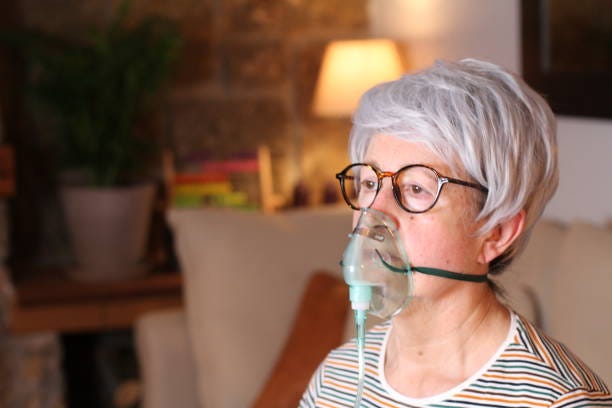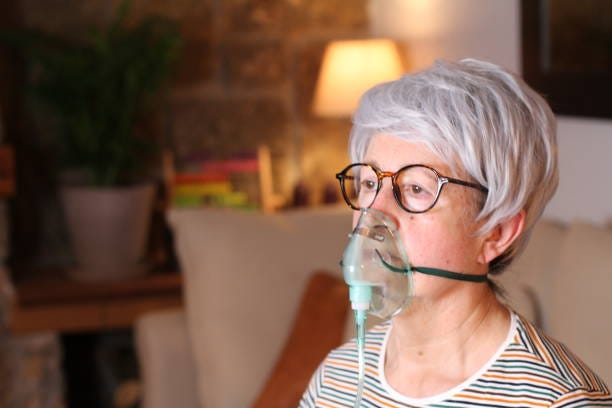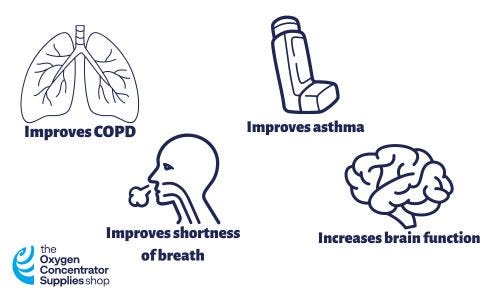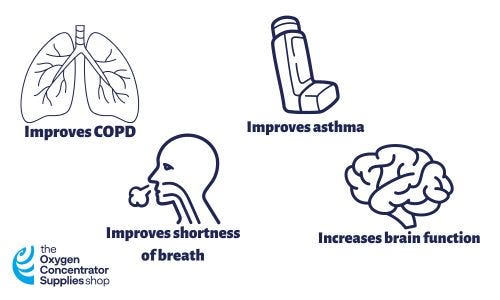Most of us take natural breathing for granted. Yet more than 25 million people in the United States have asthma and 14.8 million adults have been diagnosed with COPD.1 These serious respiratory illnesses hinder the ability of individuals to breathe normally. Many require the aid of oxygen therapy.


What is Oxygen Therapy?
Oxygen therapy provides help with breathing using supplemental oxygen delivered through a breathing mask or nasal cannula. Doctors may recommend a specific amount of oxygen needed daily or allow individuals with respiratory illnesses to rely on supplemental oxygen as needed during episodes of labored breathing. Not only can oxygen therapy be prescribed for respiratory conditions, but it can also be used as a treatment for the following things:
- Severe infections
- Severe anemia
- Carbon monoxide poisoning
- Wounds that have trouble healing
Oxygen therapy is a treatment option that must be prescribed by a healthcare professional. Each prescription is unique to the patient and takes into account a person's age, diet, level of physical activity, sleeping habits, and other lifestyle factors. A healthcare professional will also measure the oxygen level in a person's blood to determine the flow rate necessary for them to keep their oxygen level at or higher than 88%.
How is Oxygen Therapy Supplied?
Patients with respiratory illnesses who need to use oxygen therapy at home may choose between oxygen tanks or oxygen concentrators for their therapy. Supplemental oxygen in tanks is delivered in pulses not continuously and the tanks need to be replenished when the oxygen is used up.
Oxygen concentrators convert ambient air into pure oxygen, so the oxygen supply is never depleted, and new tanks are never required. Oxygen concentrators also allow oxygen to be delivered in pulse doses or in continuous doses, depending on the needs of the patient.
Why Do We Use Oxygen Therapy?
Oxygen therapy may be used short-term to treat a temporary lung illness or long-term to manage a chronic respiratory disease. Oxygen therapy is usually recommended for a range of respiratory conditions, depending on the severity including
- pneumonia
- chronic obstructive pulmonary disease (COPD)
- asthma
- cystic fibrosis
Doctors will test the amount of oxygen in the blood to determine if oxygen therapy is needed. Blood oxygen levels reveal how much oxygen is being absorbed into the body through the lungs. Insufficient blood oxygen results in noticeable and often debilitating symptoms including shortness of breath, rapid heart rate, coughing, and lightheadedness.
Does Oxygen Therapy Help Shortness of Breath?
Shortness of breath is one of the most common symptoms of a compromised respiratory system. Oxygen therapy helps improve blood oxygen saturation and improve breathing. Patients who suffer from shortness of breath may find that oxygen therapy helps them feel better during the day, sleep better at night, and have more energy for personal activities.
Portable oxygen concentrators are also helpful for patients who experience episodes of shortness of breath. They may fear a respiratory attack away from home and away from their supplemental oxygen. But with portable oxygen concentrators, they can take their oxygen therapy wherever they go to help restore healthy breathing without worry.
Types of Oxygen Therapy
Liquid Oxygen
This type of oxygen therapy is the liquid form of molecular oxygen. It is lighter than other forms of therapy and effectively increase oxygen in a person's blood, improving their overall health.
Hyperbaric Oxygen Therapy
Hyperbaric oxygen therapy (HBOT) is oxygen therapy that is pressurized in a in a pressurized chamber or tube. This treatment types allows a person to get up to three times more oxygen than breathing in oxygen at a normal level. This supplemental oxygen helps those with respiratory illness live a healthier life.
Oxygen Concentrators
Oxygen concentrators are a very common treatment option. They increase a person's ability to live their normal life users while also assisting them in breathing easier. Doctors prescribe oxygen concentrators to help their patients who have chronic lung diseases and other respiratory illnesses.
What are the Benefits of Oxygen Therapy?


There are many benefits to oxygen therapy, including:
- Improves COPD
- Improves asthma
- Decreases shortness of breath
- Increases stamina and brain function
How Will I Know I Need Oxygen Therapy?
There are many symptoms a person can look out for to potentially detect that they need oxygen therapy. They can include:
- Shortness of breath
- Feelings of dizziness
- Consistent coughing or wheezing
Can I Travel With Oxygen?
Yes, it is very possible to travel with oxygen therapy. Many oxygen concentrators are travel-friendly to use while on the go. Portable oxygen concentrators (POC) are lighter in weight and more compact in size, but still provide efficient therapy anywhere.
Additionally, POCs have many other benefits, including:
- User-friendliness
- FAA-approved
- Highly mobile and portable
- Encourages an independent lifestyle
Is it Safe to Have Oxygen in my Home?
Having oxygen at home is completely safe and normal for those who need it. However, there are a few safety precautions a person can take to safely set up oxygen therapy in their home. Since oxygen tanks and concentrators are combustible and highly flammable, it is imperative that oxygen patients are careful around fire places, stove tops, and other types of open flames.
Can I Become Addicted to Oxygen?
Oxygen therapy is not addictive. That's becasue a human body needs the adequate amount of oxygen in order for it to properly function, so receiving supplemental oxygen is highly beneficial for a person's overall health.
How Long Can You Live on Oxygen Therapy?
Oxygen therapy can be prescribed for a few weeks, a few months, or even long-term for the rest of a person's life. This is determined based on the severity of the lung disease that a person has. Additionally, a doctor will be able to change a person's oxygen settings at anytime if symptoms or other circumstances change.
Do The Effects Of Oxygen Eventually Stop Working After Prolonged Use?
The effectiveness of oxygen therapy does not decrease overtime. Supplemental oxygen is safe and beneficial to use long-term. It is always recommended to consult with a healthcare provider to determine the proper oxygen settings.
Will Oxygen Therapy Allow Me to Continue Smoking?
It is not recommended to continue smoking with using any form of oxygen therapy. Smoking counteracts the treatment a person receives because it only damages the lungs more and posisons the blood stream. Additionally, smoking around an oxygen concontrator or tank is a fire hazard and could be portentially very dangerous.
Why Choose The Oxygen Concentrator Supplies Shop?
The Oxygen Concentrator Supplies Shop offers a wide array of home oxygen concentrators and portable oxygen concentrators for every need. Our knowledgeable staff can help you in selecting the best oxygen concentrator based on your doctor’s prescription and your lifestyle. We’re here to answer any questions, so give us a call at 888-941-1688 today!
Reference
“Respiratory Disease.” Respiratory Disease - Healthy People 2030, health.gov/healthypeople/objectives-and-data/browse-objectives/respiratory-disease. Accessed January 2021.



